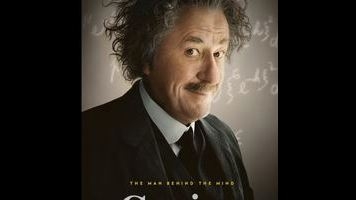Though his hairdo and rascally nature have inspired many a fictional scientist, Albert Einstein’s life has gotten surprisingly little play on the big and small screens. Where he has appeared, the German physicist has had to share cinematic space with the likes of Sir Arthur Stanley Eddington, Tim Robbins, and Yahoo Serious. But the lack of a proper Einstein biopic probably has more to do with the wide breadth of his accomplishments and adventures than a lack of interest in them. At least, that seems to be Ron Howard’s thinking on the matter. The director recently helmed the premiere of NatGeo’s Genius, a 10-part event series (or season, depending on which Emmy voter you ask) about the man whose name is practically synonymous with “genius.” And even he admits he wasn’t fully aware of the “many twists and turns” in or of “how much drama” made up the life of this particularly beautiful mind.
Howard and his collaborators (which include Brian Grazer and James Hawes) make up for lost time by doubling up on Einsteins, whose stories are separated by decades and two world wars. Geoffrey Rush stars as the more recognizable iteration of the iconic scientist; he’s Einstein, the gray-haired lecturer whose theories rubbed many of his contemporaries the wrong way. Clouds Of Sils Maria’s Johnny Flynn plays a pre-theory of relativity Einstein, or “Albert,” a young man who finds his formal schooling to be a crushing bore. They’re both brimming with intelligence and rakish charm; though they don’t look at all alike, Rush and Flynn sound and even move similarly enough to link their performances as different stages in the life of one man.
Their complementary performances buoy the first hour of the series, which otherwise adheres a little too closely to the curriculum. Einstein’s life might not have gotten the biopic treatment before, but his story is familiar enough that the small-screen introduction feels a bit like an “intro to Einstein” class. Rush and Flynn each deliver the odd line of expository dialogue that references Einstein’s rebellious past and his esteemed future, though writers Noah Pink and Kenneth Biller have the decency to avoid having either of them tell a family member that everything is “relative.”
Although it befits a docudrama about a man intent on proving that the way we experience time was but a “stubborn illusion,” the jumping back and forth from Einstein’s past to his present—where the Third Reich is on the rise—is still pretty standard biopic fare. Howard doesn’t deviate from his own modus operandi here, making sure to include a swelling score (complete with overwrought opening credits by Hans Zimmer), and crafting metaphors from tricks of the camera light. The premiere is just a little too staid, which feels at odds with the restless spirit of its subject, but it’s still a solid, occasionally beautiful hour of television.
Everything picks up in the second hour, which takes place almost entirely in the past, charting Albert’s stumbling progress through university (though, contrary to popular knowledge, he never failed math). Again, there’s a lot of source material to pull from for Einstein’s early academic life, though Genius primarily relies on Walter Isaacson’s Einstein: His Life And Universe. Most important in the second episode, we meet Mileva Marić (Samantha Colley), Albert’s fellow physics student and first wife. Here, the viewer’s familiarity with Einstein helps move the story along; because we already know what’s in store for him, director Minkie Spiro can depict Mileva’s extraordinary efforts to be considered the equal of her male peers in an arc that’s just as engrossing as the tale of two Einsteins.
The second hour of the series also benefits from a lack of foreknowledge in its viewer; because Einstein’s time at Zurich Polytechnic isn’t nearly as ingrained in the public consciousness as his general theory of relativity, his past proves to be fertile storytelling ground for Spiro. There’s a playfulness throughout the second episode that goes beyond the sex with multiple partners (though, to be fair, Rush gets the more audacious shtupping scene). While keeping a foot in the present (or, in Albert’s case, the future), Flynn is free to give pop culture a proper “young Einstein,” a man whose passions became tangled, and for whom there would never be enough answers. Rush may own the premiere—as well as have further opportunities to win the audience back—but it’s Flynn who best captures Einstein’s rebellious nature early on in the series.


 Keep scrolling for more great stories from A.V. Club.
Keep scrolling for more great stories from A.V. Club.